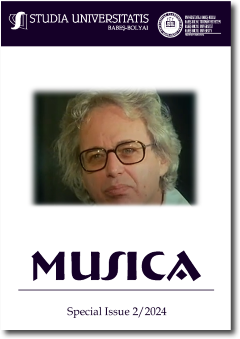Notes on Le Grand Macabre and the Aesthetics of Camp
DOI:
https://doi.org/10.24193/subbmusica.2024.spiss2.03Keywords:
Camp, opera, Ligeti, Sonntag, postmodernismAbstract
The article presents an analysis of the features of Ligeti’s opera Le Grand Macabre, indicating that it belongs to the camp aesthetics. The starting point for the analysis is the features of this aesthetic/sensitivity described by Susan Sonntag in her Notes on Camp. The opera’s libretto, its theatrical and musical layers, as well as Ligeti’s personal life experience as a composer – important for camp – are the subject of the analysis.
References
Albright, Daniel. The Witches and the Witch: Verdi’s “Macbeth” in Cambridge Opera Journal, Vol. 17(3), 2005. Pp. 225-252.
Bernard, Jonathan W. Ligeti’s Restoration of Interval and Its Significance for His Later Works in Music Theory Spectrum, Vol. 21(1), 1999. Pp. 1-31.
Booth, Mark. Campe-toi! On the Origins and Definitions of Camp in idem, Camp. New York: Routledge, 1983. Pp. 11-41.
Burston, Paul. Queens' Country. A Tour Around the Gay Ghettos, Queer Spots and Camp Sights of Britain. Boston (US): Little, Brown and Company. 2013.
Dahlhaus, Carl. What Is a Musical Drama?, transl. Mary Whittall, in Cambridge Opera Journal, Vol. 1, 1989 Pp. 95-111.
Drott, Eric. The End(s) of Genre in Journal of Music Theory, Vol. 57(1), 2013. Pp. 1-45.
Edwards, Peter. Resisting Closure: The Passacaglia Finale from György Ligeti’s “Le Grand Macabre” in Music Analysis, Vol. 35(2), 2016. Pp. 258-278.
Everett, Yayoi Uno. Signification of Parody and the Grotesque in György Ligeti’s “Le Grand Macabre” in Music Theory Spectrum, Vol. 31(1), 2009. Pp. 25-56.
Kerékfy, Márton. “A ‘New Music’ from Nothing”: György Ligeti’s Musica ricercata in Studia Musicologica, Vol. 39(3-4), 2008. Pp. 203-230.
Lindsey, Richard. Hollywood Biblical Epics. Camp Spectacle and Queer Style from the Silent Era to the Modern Day. Santa Barbara: ABC-CLIO. 2015.
Ligeti, György; Meschke, Michael. Le Grand Macabre. Oper in vier Bildern. New York: Schott, 1999.
Nekrotzar Oakenheart. Entry in https://www.worldanvil.com/w/operaquest-mezzopatricia/a/nekrotzar-oakenheart-person (last access: 08.11.2023).
Newton, Esther. Role Models in idem, Mother Camp. Female Impersonators in America. Englewood Cliffs: Prentice Hall, 1972. Pp. 97-111.
Piper Clendinnind, Jane. The Pattern-Meccanico Compositions of György Ligeti in Perspectives of New Music, Vol. 31(1), 1993. Pp. 192-234.
Reynolds, Robert. From Camp to Queer: Re-making the Australian Homosexual. Carlton South: Melbourne University Press. 2002.
Searby, Michael. Ligeti the Postmodernist? in Tempo, Vol. 199, 1997. Pp. 9-14.
Searby, Michael. Ligeti’s “Le Grand Macabre”: How He Solved the Problem of Writing a Modernist Opera in Tempo, Vol. 66(262), 2012. Pp. 29-38.
Sonntag, Susan. Notes on Camp. Jouve: Penguin Books, 2018.
Downloads
Published
How to Cite
Issue
Section
License
Copyright (c) 2024 Studia Universitatis Babeș-Bolyai Musica

This work is licensed under a Creative Commons Attribution-NonCommercial-NoDerivatives 4.0 International License.






